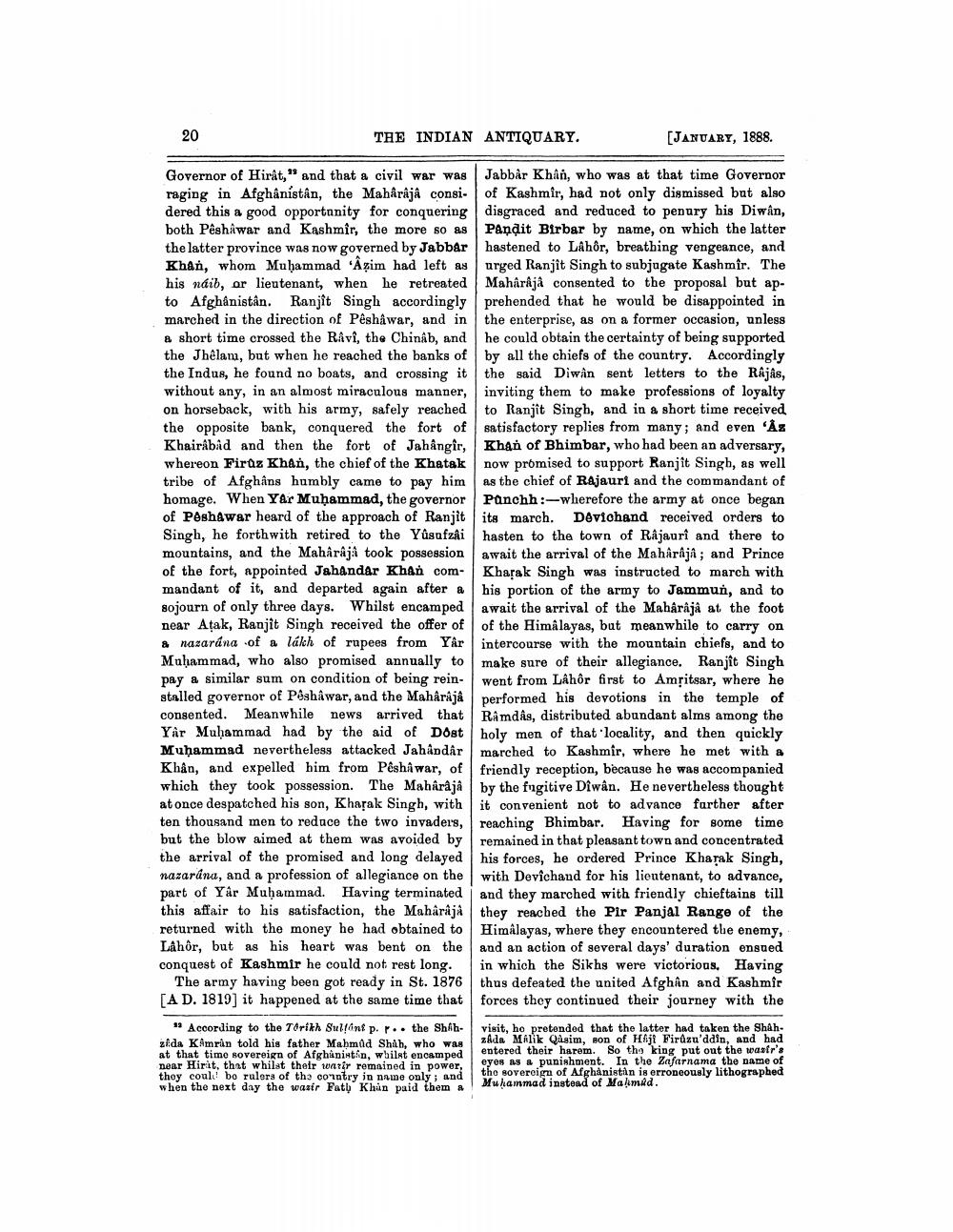________________
20
THE INDIAN ANTIQUARY.
Governor of Hirât," and that a civil war was raging in Afghanístân, the Mahârâjâ considered this a good opportunity for conquering both Peshawar and Kashmir, the more so as the latter province was now governed by Jabbar Khan, whom Muhammad Azim had left as his náib, or lieutenant, when he retreated to Afghanistan. Ranjit Singh accordingly marched in the direction of Pêshawar, and in a short time crossed the Râvî, the Chinâb, and the Jhêlam, but when he reached the banks of the Indus, he found no boats, and crossing it without any, in an almost miraculous manner, on horseback, with his army, safely reached the opposite bank, conquered the fort of Khairabad and then the fort of Jahangir, whereon Firaz Khan, the chief of the Khatak tribe of Afghans humbly came to pay him homage. When Yar Muḥammad, the governor of Peshawar heard of the approach of Ranjit Singh, he forthwith retired to the Yûsufzai mountains, and the Mahârâja took possession of the fort, appointed Jahandar Khan commandant of it, and departed again after a sojourn of only three days. Whilst encamped near Atak, Ranjit Singh received the offer of a nazarána of a lákh of rupees from Yâr Muhammad, who also promised annually to pay a similar sum on condition of being reinstalled governor of Peshawar, and the Maharajâ consented. Meanwhile news arrived that Yar Muḥammad had by the aid of Dost Muḥammad nevertheless attacked Jahåndâr Khân, and expelled him from Pêshawar, of which they took possession. The Mahârâjâ at once despatched his son, Kharak Singh, with ten thousand men to reduce the two invaders, but the blow aimed at them was avoided by the arrival of the promised and long delayed nazarana, and a profession of allegiance on the part of Yar Muḥammad. Having terminated this affair to his satisfaction, the Maharaja returned with the money he had obtained to Lâhôr, but as his heart was bent on the conquest of Kashmir he could not rest long.
The army having been got ready in St. 1876 [A D. 1819] it happened at the same time that
[JANUARY, 1888.
Jabbar Khan, who was at that time Governor of Kashmir, had not only dismissed but also disgraced and reduced to penury his Diwân, Pandit Birbar by name, on which the latter hastened to Lâhôr, breathing vengeance, and urged Ranjit Singh to subjugate Kashmir. The Mahârâjà consented to the proposal but apprehended that he would be disappointed in the enterprise, as on a former occasion, unless he could obtain the certainty of being supported by all the chiefs of the country. Accordingly the said Diwan sent letters to the Rajâs, inviting them to make professions of loyalty to Ranjit Singh, and in a short time received satisfactory replies from many; and even 'Az Khan of Bhimbar, who had been an adversary, now promised to support Ranjit Singh, as well as the chief of Rajauri and the commandant of Punchh:-wherefore the army at once began its march. Dêvichand received orders to hasten to the town of Rajauri and there to await the arrival of the Maharaja; and Prince Kharak Singh was instructed to march with his portion of the army to Jammun, and to await the arrival of the Mahârâjâ at the foot of the Himalayas, but meanwhile to carry on intercourse with the mountain chiefs, and to make sure of their allegiance. Ranjit Singh went from Lâhôr first to Amritsar, where he performed his devotions in the temple of Râmdâs, distributed abundant alms among the holy men of that locality, and then quickly marched to Kashmir, where he met with a friendly reception, because he was accompanied by the fugitive Dîwân. He nevertheless thought it convenient not to advance further after reaching Bhimbar. Having for some time remained in that pleasant town and concentrated his forces, he ordered Prince Kharak Singh, with Devichand for his lieutenant, to advance, and they marched with friendly chieftains till they reached the Pir Panjal Range of the Himalayas, where they encountered the enemy, and an action of several days' duration ensued in which the Sikhs were victorious. Having thus defeated the united Afghan and Kashmir forces they continued their journey with the
13 According to the Torikh Sulfont p. r. the Shihzida Kamran told his father Mahmûd Shah, who was at that time sovereign of Afghanistan, whilst encamped near Hirit, that whilst their watir remained in power, they could be rulers of the country in name only; and when the next day the wazir Fath Khan paid them a
visit, he pretended that the latter had taken the Shahzada Malik Qasim, son of Hiji Firâzu'ddin, and had entered their harem. So the king put out the wastr's eyes as a punishment. In the Zafarnama the name of the sovereign of Afghanistan is erroneously lithographed Muhammad instead of Mahmad.




